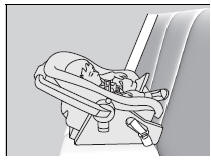Honda Civic Owners Manual: Protecting Infants
An infant must be properly restrained in a rear-facing, reclining child seat until the infant reaches the seat manufacturer’s weight or height limit for the seat, and the infant is at least one year old. Many experts recommend use of a rear-facing seat for a child up to two years old if the child’s height and weight are appropriate for a rearfacing seat.
Positioning a rear-facing child seat

Child seats must be placed and secured in a rear seating position.
When properly installed, a rear-facing child seat may prevent the driver or a front passenger from moving their seat all the way back, or from locking their seat-back in the desired position.
It can also interfere with proper operation of the passenger’s advanced front airbag system.
If this occurs, we recommend that you install the child seat directly behind the front passenger’s seat, move the seat as far forward as needed, and leave it unoccupied.
Or, you may wish to get a smaller rear-facing child seat.
WARNING
Placing a rear-facing child seat in the front seat can result in serious injury or death during a crash.
Always place a rear-facing child seat in the rear seat, not the front.
Rear-facing child seats should never be installed in a forward facing position.
Always refer to the child seat manufacturer’s instructions before installation.
 Protecting Smaller Children
Protecting Smaller Children
If a child is at least one year old and within the weight range indicated by
the child
seat manufacturer, the child should be properly restrained in a firmly secured
forward-facing child seat.
Fo ...
See also:
Honda Civic Owners Manual. RDM Conditions and Limitations
The system may not properly detect lane markings and the position of your
vehicle
►nder certain conditions. Some examples of these conditions are listed below.
Environmental conditions
Driving in bad weather (rain, fog, snow, etc.).
Sudden changes between light and ...

